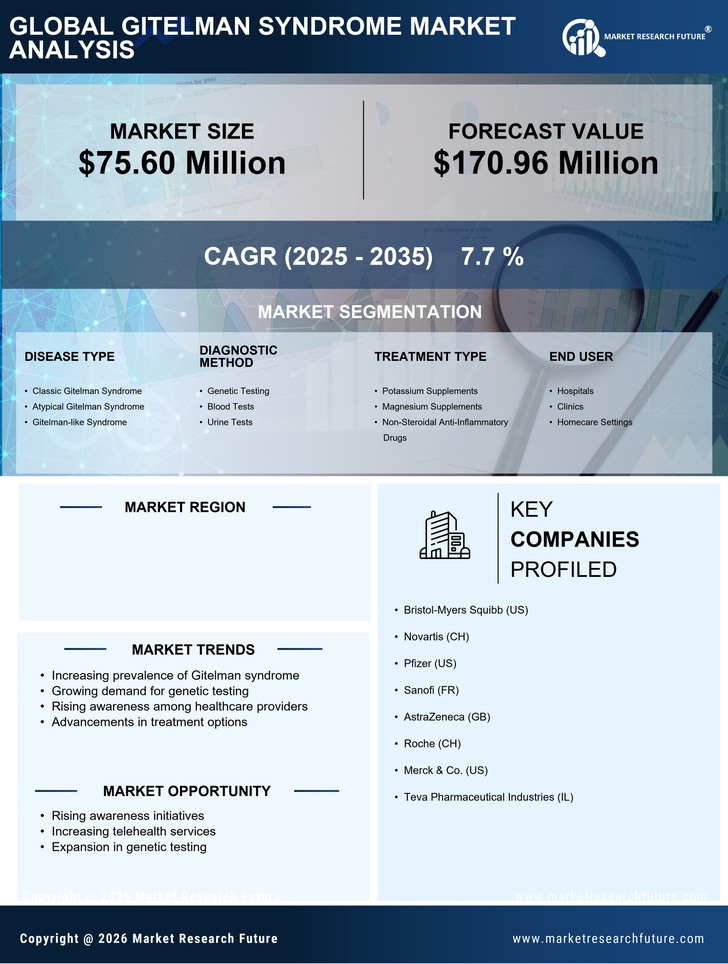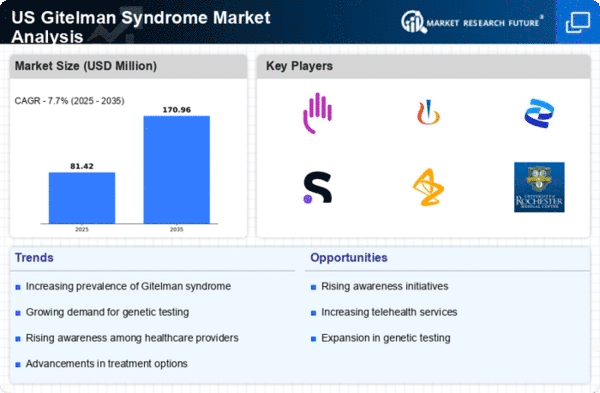Increased Research Funding
Increased research funding for rare diseases, including gitelman syndrome, is a crucial driver for the market. Government and private organizations are allocating more resources to understand the genetic and biochemical mechanisms underlying this condition. This influx of funding is expected to facilitate clinical trials and research initiatives aimed at developing new therapies. As a result, the gitelman syndrome market may benefit from a surge in innovative treatment options and improved diagnostic tools. The potential for breakthroughs in understanding the pathophysiology of gitelman syndrome could lead to enhanced patient care and management strategies, further stimulating market growth.
Growing Patient Advocacy Groups
The emergence of patient advocacy groups dedicated to gitelman syndrome is influencing the market landscape. These organizations play a vital role in raising awareness, providing education, and supporting research initiatives. By fostering community engagement and collaboration among patients, healthcare providers, and researchers, these groups are likely to enhance the visibility of gitelman syndrome. This increased awareness may lead to more individuals seeking diagnosis and treatment, thereby expanding the gitelman syndrome market. Additionally, advocacy efforts can drive funding for research and development, ultimately benefiting patients through improved access to therapies and support services.
Innovations in Treatment Modalities
Innovations in treatment modalities are significantly impacting the gitelman syndrome market. Recent advancements in pharmacological therapies, including the use of potassium-sparing diuretics and magnesium supplements, have shown promise in managing symptoms effectively. The market is projected to grow as new treatment options emerge, potentially improving patient outcomes and quality of life. Furthermore, the introduction of personalized medicine approaches may allow for tailored therapies based on individual genetic profiles, which could enhance treatment efficacy. As a result, the gitelman syndrome market is likely to witness an influx of novel therapies that cater to the specific needs of patients, thereby expanding the market landscape.
Rising Incidence of Gitelman Syndrome
The gitelman syndrome market is experiencing growth due to the rising incidence of this rare genetic disorder. Recent estimates suggest that the prevalence of gitelman syndrome in the US is approximately 1 in 40,000 individuals. This increasing recognition of the condition is likely to drive demand for diagnostic services and treatment options. As healthcare providers become more aware of the symptoms associated with gitelman syndrome, such as hypomagnesemia and hypokalemia, the number of diagnosed cases is expected to rise. Consequently, this trend may lead to a more robust market for therapies and management strategies tailored to this condition, thereby enhancing the overall gitelman syndrome market.
Regulatory Support for Rare Disease Treatments
Regulatory support for treatments targeting rare diseases, including gitelman syndrome, is a significant driver for the market. The US Food and Drug Administration (FDA) has implemented various initiatives to expedite the approval process for orphan drugs, which are designed to treat conditions affecting fewer than 200,000 individuals. This regulatory environment encourages pharmaceutical companies to invest in the development of therapies for gitelman syndrome. As a result, the gitelman syndrome market is likely to see an increase in the number of approved treatments, enhancing patient access to necessary medications and improving overall health outcomes.

















